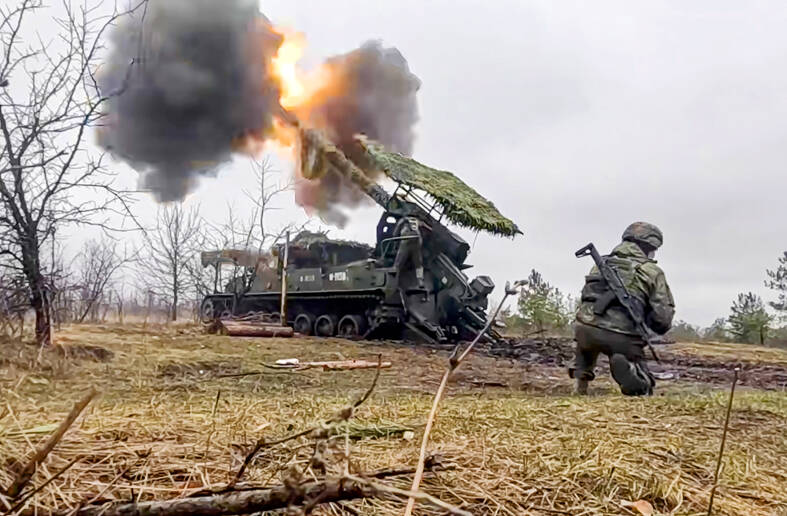US President Donald Trump said he was “very angry” at Russian President Vladimir Putin and threatened “secondary tariffs” on buyers of Russian oil if Moscow refuses a ceasefire with Ukraine.
In comments reported by NBC News, Trump said he was “pissed off” at Putin for casting doubt on Ukrainian President Volodymyr Zelenskiy’s legitimacy as a negotiating partner, and threatened curbs on “all oil coming out of Russia.”
He later added that he did not think the Russian president would “go back on his word.”

Photo: EPA-EFE / Russian Ministry of Defense
While Trump appeared to temper his remarks, the threats mark a significant change of tone for Washington and suggest a possible souring in relations with his Russian counterpart over the pace of ceasefire talks.
Before taking office, Trump said he could resolve the war quickly, but the conflict rages on more than two months later.
“I certainly wouldn’t want to put secondary tariffs on Russia,” Trump later clarified in comments to reporters on Air Force One, adding that he was “disappointed” with some of Putin’s recent comments on Zelenskiy.
“He’s supposed to be making a deal with him, whether you like him or don’t like him. So I wasn’t happy with that. But I think he’s going to be good,” he said.
Trump’s frustration was sparked by comments Putin made on Friday that implicitly challenged Zelenskiy’s legitimacy by proposing the UN should take over Ukraine with a temporary government overseen by the US and possibly even some European countries.
The Kremlin yesterday said that Putin remained open to contacts with Trump.
“If necessary, their conversation will be organized very quickly,” Kremlin spokesman Dmitry Peskov told reporters, according to the state-run Tass news agency, though he said no call had been scheduled yet.
Peskov also said that Russia was continuing to work with the US to build bilateral relations, according to Tass.
Meanwhile, Trump maintained pressure on Zelenskiy to agree to a deal to give the US access to Ukraine’s resources.
“He’s trying to back out of the rare earth deal and if he does that he’s got some problems — big, big problems,” Trump said. “If he’s looking to renegotiate the deal, he’s got big problems.”
Russia is one of the world’s three largest oil producers, meaning any attempt to punish purchases of Russian supplies could have a far-reaching effect on the oil market, and any disruptions could add to inflationary pressures.
Nevertheless, with a week of tariffs and other measures to evaluate — and the uncertainty that Russian supplies would really be hit with levies, oil barely moved.
Should the US press ahead, India and China, which have become the key buyers of discounted Russian barrels since Moscow’s full-scale invasion of Ukraine, would face particular pressure. Russian crude exports hit a five-month high last month and US sanctions on Russia’s oil tanker fleet are showing signs of faltering.

CHIP WAR: The new restrictions are expected to cut off China’s access to Taiwan’s technologies, materials and equipment essential to building AI semiconductors Taiwan has blacklisted Huawei Technologies Co (華為) and Semiconductor Manufacturing International Corp (SMIC, 中芯), dealing another major blow to the two companies spearheading China’s efforts to develop cutting-edge artificial intelligence (AI) chip technologies. The Ministry of Economic Affairs’ International Trade Administration has included Huawei, SMIC and several of their subsidiaries in an update of its so-called strategic high-tech commodities entity list, the latest version on its Web site showed on Saturday. It did not publicly announce the change. Other entities on the list include organizations such as the Taliban and al-Qaeda, as well as companies in China, Iran and elsewhere. Local companies need

CRITICISM: It is generally accepted that the Straits Forum is a CCP ‘united front’ platform, and anyone attending should maintain Taiwan’s dignity, the council said The Mainland Affairs Council (MAC) yesterday said it deeply regrets that former president Ma Ying-jeou (馬英九) echoed the Chinese Communist Party’s (CCP) “one China” principle and “united front” tactics by telling the Straits Forum that Taiwanese yearn for both sides of the Taiwan Strait to move toward “peace” and “integration.” The 17th annual Straits Forum yesterday opened in Xiamen, China, and while the Chinese Nationalist Party’s (KMT) local government heads were absent for the first time in 17 years, Ma attended the forum as “former KMT chairperson” and met with Chinese People’s Political Consultative Conference Chairman Wang Huning (王滬寧). Wang

CROSS-STRAIT: The MAC said it barred the Chinese officials from attending an event, because they failed to provide guarantees that Taiwan would be treated with respect The Mainland Affairs Council (MAC) on Friday night defended its decision to bar Chinese officials and tourism representatives from attending a tourism event in Taipei next month, citing the unsafe conditions for Taiwanese in China. The Taipei International Summer Travel Expo, organized by the Taiwan Tourism Exchange Association, is to run from July 18 to 21. China’s Taiwan Affairs Office spokeswoman Zhu Fenglian (朱鳳蓮) on Friday said that representatives from China’s travel industry were excluded from the expo. The Democratic Progressive Party government is obstructing cross-strait tourism exchange in a vain attempt to ignore the mainstream support for peaceful development

ELITE UNIT: President William Lai yesterday praised the National Police Agency’s Special Operations Group after watching it go through assault training and hostage rescue drills The US Navy regularly conducts global war games to develop deterrence strategies against a potential Chinese invasion of Taiwan, aimed at making the nation “a very difficult target to take,” US Acting Chief of Naval Operations James Kilby said on Wednesday. Testifying before the US House of Representatives Armed Services Committee, Kilby said the navy has studied the issue extensively, including routine simulations at the Naval War College. The navy is focused on five key areas: long-range strike capabilities; countering China’s command, control, communications, computers, cyber, intelligence, surveillance, reconnaissance and targeting; terminal ship defense; contested logistics; and nontraditional maritime denial tactics, Kilby